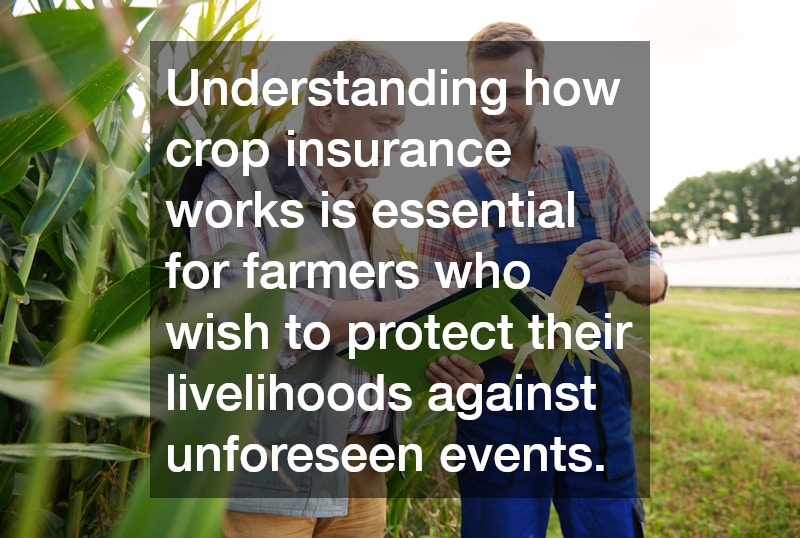
This article examines the fundamentals of crop insurance, providing insights into its significance, various types, and operational aspects, with a focus on Illinois. Crop insurance is a vital tool for farmers aiming to manage risk and ensure the stability of their agricultural operations.
What is Crop Insurance?
Definition and Purpose
Crop insurance is a form of risk management designed to protect farmers from the potential financial losses that can arise due to natural disasters like droughts, floods, or hurricanes. Its primary purpose is to ensure that farmers maintain a stable income, even when crop yields are adversely affected.
By providing a safety net, crop insurance helps farmers focus on their agricultural pursuits with fewer worries about the volatile elements of farming.
Moreover, crop insurance serves to stabilize the agricultural sector, promoting a more resilient and sustainable farming community. It achieves this by offering a financial buffer, allowing farmers to cover operational costs even when production is lower than expected. Through crop insurance, farmers can manage the inherent risks of agriculture, thereby contributing to a more robust agricultural economy.
The purpose extends beyond individual benefit, as it plays a crucial role in ensuring food supply consistency across regions. With crop insurance, there’s a mechanism in place to mitigate the impacts of potential food shortages, benefitting the wider community and economy. Consequently, the role of crop insurance goes beyond financial protection; it is fundamental for societal food security.
How Does Crop Insurance Work in Illinois?
Key Features and Mechanisms
In Illinois, crop insurance operates through a combination of federal support and local mechanisms to facilitate effective coverage for farmers. The state’s farmers can choose from multiple insurance plans tailored to their specific needs, providing flexibility in risk management strategies. Familiarizing with crop insurance IL features helps farmers make informed decisions that are most beneficial to their unique circumstances.
Key features include the availability of yield-based and revenue-based plans, each offering unique advantages to farmers dependent on their specific risk concerns. These mechanisms are sustained through a partnership between government subsidies and private insurance providers, enhancing their efficiency and accessibility for farmers. Illinois, known for its diverse agricultural landscape, requires such well-structured insurance mechanisms.
An understanding of crop insurance IL features reveals additional benefits, such as premium subsidies, which make coverage affordable for a wide range of farmers. This comprehensive approach ensures there’s a suitable option for farmers to protect themselves against both predictable and unforeseen risks, ultimately supporting the stability of Illinois’s agricultural economy. Farmers thus feel equipped to tackle the uncertainties associated with farming.
What Types of Crop Insurance Are Available?
Types and Their Benefits
Farmers can choose from various types of crop insurance, primarily categorized into yield-based and revenue-based policies. Yield-based insurance protects against losses in crop yield, ensuring farmers receive compensation whenever production falls below expected levels. This type of insurance is beneficial in scenarios prone to weather-related disruptions.
On the other hand, revenue-based insurance offers coverage against price declines that adversely affect the expected revenue from harvested crops. This type is particularly useful in volatile markets, where unforeseen price drops could jeopardize a farmer’s income. By evaluating the potential risks, farmers can select a policy type that best aligns with their operational needs and financial goals.
Each insurance type brings its own set of advantages, and farmers often combine different policies to create a comprehensive risk management strategy. This tailored approach ensures that farmers receive the right level of protection, enhancing their resilience against both natural and market-induced challenges. While the choice of insurance varies from farm to farm, the overarching benefit remains: increased financial security.
How to Apply for Crop Insurance in Illinois?
Application Process
Applying for crop insurance in Illinois involves a structured process designed to ensure comprehensive coverage. Farmers begin by understanding the specific requirements and options available, including important deadlines and necessary documentation. Crop insurance IL applications require timely submission to align with the agricultural calendar.
The application entails providing details about the farming operations, anticipated crop yields, and historical performance data. This information is crucial for insurance providers to assess risk levels and determine suitable coverage plans. Farmers are encouraged to engage with insurance agents who can offer guidance and insights during the application process.
Accurate and thorough documentation submission increases the likelihood of successful enrollment. Following the application guidelines and meeting deadlines are essential steps in securing a dependable insurance policy that caters to the farmer’s needs. Assistance from knowledgeable agents and consistent communication are key factors in smooth application processes.
Why is Crop Insurance Important for Illinois Farmers?
Impact and Advantages
Crop insurance offers significant importance to Illinois farmers by providing them with a financial safety net, ensuring stability amidst unpredictable agricultural conditions. This insurance acts as a protective shield against the economic setbacks of production losses, safeguarding farmers’ livelihoods and economic viability.
By securing a reliable income stream, crop insurance empowers farmers to invest in better technologies and sustainable farming practices, further enhancing productivity. Illinois stands out as a major agricultural hub, and implementing effective crop insurance policies contributes to its strategic importance in the national and global food supply chain.
In conclusion, understanding how crop insurance works, especially within Illinois, is essential for farmers who wish to protect their livelihoods against unforeseen events. The right insurance plan can provide peace of mind and financial stability, supporting farmers as they continue their critical work.
.







